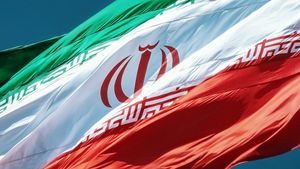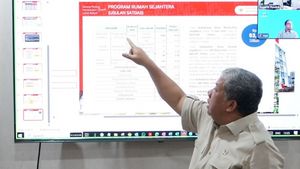JAKARTA - The Attorney General's Office will have the authority to wiretap if approved. This is stated in the revision of Law Number 16 of 2004 concerning the Prosecutor's Office.
Researcher at the Center for Law and Policy Studies (PSHK) Fajri Nursyamsi assesses that this authority is vulnerable to abuse and violations of human rights.
"Article 30c letter (k) of the Prosecutor's Bill which includes the wiretapping authority, must be understood as an effort that is vulnerable to abuse and human rights violations," said Fajri at the Commission III DPR RI Public Hearing Meeting (RDPU) at the RI DPR Building, Jakarta, reported by Antara, Wednesday, November 17.
Article 30c letter (k) states that the prosecutor's office has the authority to conduct wiretapping and to organize a monitoring center in the field of criminal acts.
According to Fajri, there needs to be very clear, firm boundaries, and measurable and limited procedures within the scope of law enforcement related to the wiretapping authority.
He offered other options related to the wiretapping authority, namely: first, the arrangements need to be completed in the bill, starting from the use, procedures, to the involvement of the relevant institutions.
Second, complete the Wiretapping Bill first because it is part of the mandate of the Constitutional Court's decision on wiretapping that must be regulated in the context of the law, especially a separate law that has already been pushed forward in the DPR.
Therefore, he suggested that the wiretapping concept in the Wiretapping Bill be resolved first and the debate was not in the context of who has the authority to tap, but what the procedures, impacts, and limitations are on the wiretapping authority.
According to him, in this context, law enforcement agencies can be the institutions that have the authority for this wiretapping. However, what is the procedure, what are the limitations that must be discussed first.
"When the DPR as the legislators and the President have agreed on the mechanism, they can move on who can use the wiretapping authority," he said.
Fajri also highlighted the granting of authority to the prosecutor's office in multimedia supervision as regulated in Article 30b letter (f) which he considered irrelevant to be attached to the law enforcement institution.
Article 30b letter (f) states that in law enforcement intelligence, the prosecutor's office is authorized to carry out multimedia supervision.
"We assess that the faster development is in the Books System Law (Law Number 3 of 2017) which already has its own supervisory mechanism and the prosecutor's office is involved in the context of law enforcement, not the supervision that has been carried out so far," he said.
He assessed that the prosecutor's involvement in taking action against problematic multimedia content should be in law enforcement through the judicial process, not included in the realm of supervision in the context of law enforcement intelligence.
The RDPU for Commission III of the DPR was led by Deputy Chairperson of Commission III of the DPR RI, Adies Kadir and Prince Khairul Saleh, to ask for public input regarding the revision of the Prosecutor's Law.
Present at the RDPU were Head of the Indonesian Prosecutor's Commission Barita Simanjuntak, FHUI Professor Topo Santoso, Director of the Anti-Corruption Society (MAKI) Boyamin Saiman, PSHK researcher Fajri Nursyamsi, and KontraS researcher Syahar Banu.
The English, Chinese, Japanese, Arabic, and French versions are automatically generated by the AI. So there may still be inaccuracies in translating, please always see Indonesian as our main language. (system supported by DigitalSiber.id)













